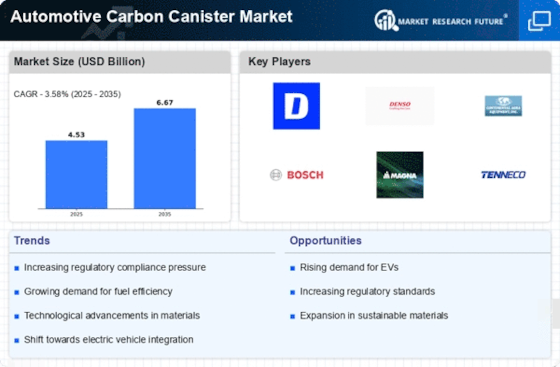Top Industry Leaders in the Automotive Carbon Canister Market
*Disclaimer: List of key companies in no particular order
Top listed global companies in the Automotive Carbon Canister industry are:
Stant Corporation
Okay, Motor Products Hangzhou Inc.
Nanjing Depurate Catalyst Co., Ltd.
RADIANT LUBES PVT. LTD.
ALEC TIRANTI LIMITED
Robert Bosch GmbH
Guangzhou Best Auto Parts Company Limited
Aptiv PLC
Guangzhou Yao Xiao Auto Parts Co., Ltd.
Bridging the Gap by Exploring the Competitive Landscape of the Automotive Carbon Canister Top Players
The automotive carbon canister market, fuelled by stringent emission regulations and a growing focus on environmental sustainability, is poised for significant expansion in the coming years. This crucial emission control device captures and absorbs fuel vapors, preventing their release into the atmosphere. As the demand for cleaner vehicles intensifies, understanding the competitive landscape becomes paramount for both established players and aspiring entrants.
Key Player Strategies:
Leading manufacturers in the market, such as Bosch, Continental, UFI Filters, and Denso, are adopting diverse strategies to solidify their positions. These include:
- Technological innovation: Investing in research and development to enhance canister performance, optimize material usage, and introduce advanced functionalities like self-regenerating canisters.
- Strategic acquisitions and partnerships: Expanding their presence in emerging markets and leveraging the expertise of smaller players with niche technologies.
- Vertical integration: Strengthening control over the supply chain by acquiring raw materials and manufacturing capabilities, ensuring cost-efficiency and quality control.
- Focus on sustainability: Developing canisters with bio-based materials or adopting recycling programs to reduce environmental impact and cater to the growing eco-conscious consumer base.
Factors for Market Share Analysis:
Analyzing market share in the automotive carbon canister market requires a multi-pronged approach, considering:
- Geographical presence: The dominance of regional players and their ability to cater to specific emission regulations and vehicle types.
- Product portfolio: The diversity and quality of canisters offered, catering to different vehicle segments (passenger cars, heavy-duty vehicles) and specific engine configurations.
- Cost competitiveness: Balancing production costs with technological advancements and maintaining attractive pricing for OEMs and aftermarket customers.
- Brand reputation and customer service: Building trust and reliability through established brands and efficient after-sales support.
Emerging Trends Shaping the Market:
Several new and exciting trends are emerging within the automotive carbon canister market, presenting both challenges and opportunities:
- Electrification: The rise of electric vehicles presents a potential disruption, as these vehicles have different emission control needs. However, some manufacturers are developing hybrid canisters suitable for both gasoline and electric powertrains.
- Connected car technology: Integration of sensors and data analytics into canisters could enable real-time emission monitoring, predictive maintenance, and personalized emission control strategies.
- Advanced materials: Research on alternative materials like graphene and nanocomposite fibers could lead to lighter, more efficient, and longer-lasting canisters.
Competitive Scenario:
The overall competitive landscape is characterized by a mix of established players, regional specialists, and innovative newcomers. Tier-1 suppliers hold a majority share, catering directly to OEMs. However, the aftermarket segment offers opportunities for smaller players with cost-effective and niche solutions. Collaboration and strategic partnerships are becoming increasingly common, with players combining their expertise to address complex technical challenges and navigate diverse markets.
The automotive carbon canister market is a dynamic and promising space, driven by environmental regulations, technological advancements, and changing consumer preferences. Understanding the key player strategies, market share factors, and emerging trends is crucial for navigating this competitive landscape. By continuously adapting and innovating, both established players and aspiring entrants can capitalize on the growth potential and contribute to a cleaner and more sustainable future for the automotive industry.
Latest Company Updates:
Stant Corporation:
- October 2023: Launched a new line of high-performance carbon canisters with extended service life and enhanced vapor adsorbent capacity. (Source: Stan Corporation press release)
Robert Bosch GmbH:
- July 2023: Developed a software algorithm for optimizing carbon canister purging cycles, resulting in improved fuel efficiency and reduced emissions. (Source: SAE International)
Guangzhou Best Auto Parts Company Limited:
- October 2023: Received a multi-million dollar contract from a major Chinese automaker to supply carbon canisters for their upcoming SUV model. (Source: Yicai Global)
Aptiv PLC:
- June 2023: Announced plans to invest in a joint venture with a Korean company to develop and manufacture next-generation emission control systems, including advanced carbon canisters. (Source: Bloomberg)










